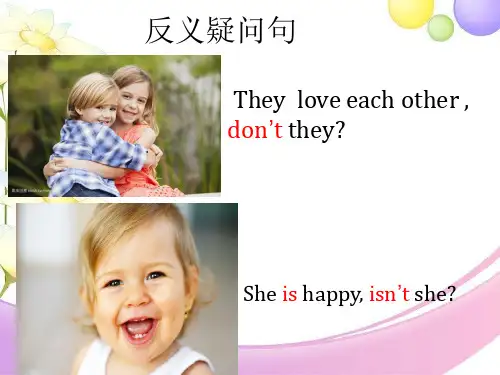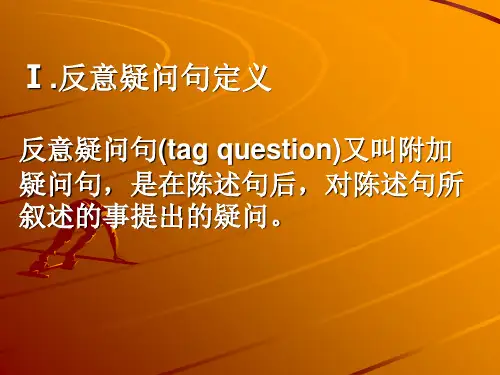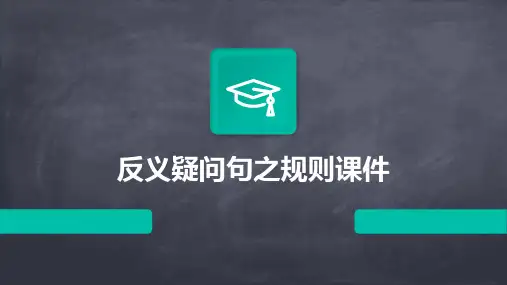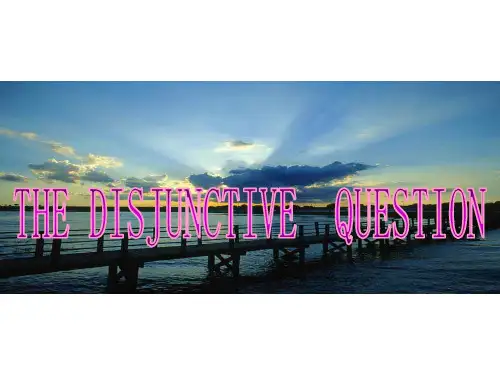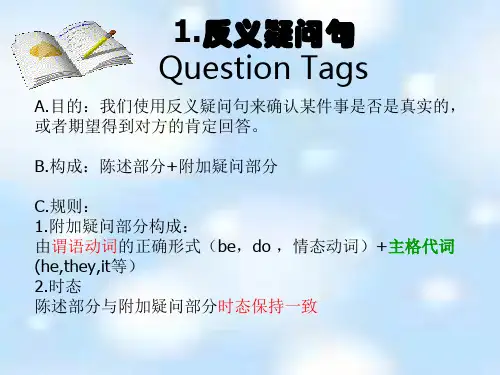- 1、下载文档前请自行甄别文档内容的完整性,平台不提供额外的编辑、内容补充、找答案等附加服务。
- 2、"仅部分预览"的文档,不可在线预览部分如存在完整性等问题,可反馈申请退款(可完整预览的文档不适用该条件!)。
- 3、如文档侵犯您的权益,请联系客服反馈,我们会尽快为您处理(人工客服工作时间:9:00-18:30)。
didn’t he Liu Xiang won the hurdle race again, _______? Yes, he did.
wasn’t there There was a heavy snow last year, _________? Yes, there was.
反意疑问句/ 附加疑问句--反意疑问句 附加疑问句 陈述句+附加问句 陈述句 附加问句 规则: 规则: 1. 前肯,后否; 前肯,后否; 2. 前否,后肯; 前否,后肯; 3. 附加问句和陈述句人称、时态一 附加问句和陈述句人称、 相应时态的助动词的肯定 的肯定/ 致(相应时态的助动词的肯定 否定形式+人称代词 人称代词)。 否定形式 人称代词)。
特殊用法4 特殊用法4
陈述部分如果有否定意义的词, 陈述部分如果有否定意义的词 , 如 : hardly( 几乎 ( 不), never(从不), nothing, few, little, no, seldom(很 (从不) ( 以至于不能) 少), too…to(太…以至于不能) 等, 这时疑问部分要 ( 以至于不能 用肯定形式。 用肯定形式。
isn’t it It’s cold ,___________? Yes,it is.
They are playing football, aren’t they?
Yes, they are.
do they They don’t like swimming,_________? Yes, they do. They like it a lot.
特殊用法2 特殊用法 情态动词的反义疑问句 陈述句+情态动词的简短否定/ 肯定+主语 陈述句+情态动词的简短否定/ 肯定 主语? 主语 • 1) He can play the piano,_________? can’t he
shouldn’t he • 2) He should go right now, __________? can they • 3)They can’t finish it, ___________? )
特殊用法1 祈使句的反意疑问句: 特殊用法 ---祈使句的反意疑问句:
在祈使句后面附加问句, 在祈使句后面附加问句 , 以加强语气或使祈使 句听起来较委婉、 客气。 句听起来较委婉 、 客气 。 附加问句可选用 “ will you? ”“ ”“won’t you?”。 。 祈使句为否定结构时 祈使句为否定结构时,附加问句一般只用 “will 否定结构时, you?”. 陈述句为 “Let’s…” 结构时, 表示建议,其意思 结构时, 表示建议, 包括对方, 让我们(你我双方) 包括对方,即“让我们(你我双方)”附加问句一 般用 “shall we?” 。 结构时, 表示请求, 陈述句为 “Let us…” 结构时, 表示请求,其意 思不包括对方, 你让我们…( 思不包括对方,即“你让我们 (You let us)”,附 ) 附 加问句一般用 “will you?”
were they They weren’t in the zoo last Sunday, _______? No, they weren’t. They went to the mountains.
didn’t it It rained heavily yesterday, _______? Yes, it did.
反义疑问句 (The Disjunctive Question)又 ) 叫附加疑问句。 叫附加疑问句。它表示提问人的 看法,没有把握,需要对方证实。 看法,没有把握,需要对方证实。 反义疑问句由两部分组成: 反义疑问句由两部分组成:前一 部分是一个陈述句, 部分是一个陈述句,后一部分是 一个简短的疑问句, 一个简短的疑问句,两部分的人 称时态应保持一致。 称时态应保持一致。
特殊用法5 特殊用法5
回答反意疑问句的问题时,要注意根据事情情况回答.只 要事实是肯定的,就用Yes回答,如果事实是否定的,就 用No回答,不管第一部分句子是肯定或否定。Yes/ No 和 之后的简略回答必须一致。(注意中文和英文思维的差异)
• 1. The book isn’t so boring, is it? Yes, it is. _______________. It’s the worst book I have ever read. No, it isn’t. _______________. It’s fun, I think. • 2. You haven’t been to the U. S. , have you? No, I haven’t. _______________. I want to have a visit one day. Yes, I have. _______________. I have been there three times.
含有ought to 的反意疑问句,陈述部分是肯定 的反意疑问句, 含有 主语。 的,疑问部分用shouldn't / oughtn't +主语。 疑问部分用 主语
He ought to know what to do, oughtn't he? / shouldn't he?
特殊用法3---There be句型的反意疑问句 句型的反意疑问句。 特殊用法 句型的反意疑问句
带情态动词dare或need的反意 或 带情态动词 的反意 疑问句, 疑问句,疑问部分常用 need (dare ) +主语。 主语。 主语 We need not do it again, need we ? He dare not say so, dare you?
为实义动词时, 当dare, need 为实义动词时, 疑问部分用助动词 do + 主语。 主语。 She doesn't dare to go home alone, does she?
行为动词: 行为动词:
doesn’t it 1. It often rains here, ________ ___ ? 2. He likes soccer, _________ ____ ? doesn’t he 3. You have a headache, _______ you? don’t ___ 4. I called you yesterday, _______ __? didn’t I
• 1.Mr. Smith can hardly speak Chinese, can he ________? • 2.She has never been to Hong Kong,has she ___________? • 3.There is nothing important in the newspaper, is there ______________? do they • 4.Few people eat wild animals now, __________? does he • 5.He knows little German, ____________ ? • 6.You have seldom met him recently, ________? ? have you is he • 7.He is too young to join the army, ___________?
其它动词: 其它动词:
1. You will go to America, ______ ___ ? won’t you 2. We have ever been to Shanghaቤተ መጻሕፍቲ ባይዱ, _________ ______ ? haven’t we
2. 前否,+ 后肯 前否, 1. You aren’t an actor, ______ ____ ? are you 2. He isn’t a good boy, ______ _____ ? is he 3. It wasn’t fine yesterday, ____ ____ ? was it 4. It doesn’t rain here, ______ ____ ? does it 5. His sister doesn’t have a headache, ________ _____ ? does she 6. You didn’t call me yesterday, did you _______ _____?
7. You won’t go to U.S.A., ______ ____? will you 8. There isn’t a boy in our classroom, ______ _______ ? is there 9. There weren’t many cars in the street, _______ _______ ? were there will you 10. Don’t smoke, _______ _____ ? 11. Let’s do it, _______ _____ ? shall we
---祈使句 祈使句 1. Sit down please, _______________ ? will / won’t you 2. Please call me, _________________? will / won’t you 3. Let’s go home, ________________ ? shall we will / won’t you 4. Let us go home, ________________ ? will you 5. Don’t leave now, ________________?
wasn’t she Lily was ill in bed, _________? Yes, she was.
was she She wasn’t at home, _______? No, she wasn’t.
